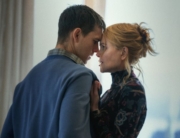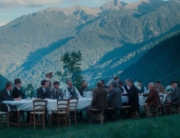The Prague Spring of 1968, in what was then Czechoslovakia, gave birth to the exuberant “Czech New Wave” in cinema. Its crushing continues to have somber resonance, as history repeats the cycle of repression, protest, and suppression. Just as the self-immolation of a protesting Tunisian set the spark for the Arab Spring that is now being countered with oppression, a “burning bush” in Wenceslas Square in 1969 lit up people’s hopes and caused panic 20 years before the Communist regime finally fell.
Polish director Agnieszka Holland lived through this tumultuous period as a film student in Prague. In Burning Bush, she blends archival footage, real settings, and artifacts from key months that are not familiar to American audiences beyond the images of the Soviet Union’s tanks rolling through in August 1968, and that open the film. Beyond the history, she keeps the focus intensely on the intimate and personal impact and political repercussions for those on all sides of Communist authoritarianism.
The film urgently follows Jan Palach (Lukas Cernoch) in January 1969, as he methodically goes downtown, leaves behind his student ID, fills buckets with gasoline, and ignites himself in the center of Prague. Horrified bystanders try to help him, and he’s rushed to the hospital. His accompanying protest declaration that he was only “Torch Number 1” is found, with a timetable threat of more to come. His desperate act sets off panicked reactions—from his family and friends, from activists—and the authorities: the police, security service, and politicians.
His anguished brother Jirí (Petr Stach) is on a frantic race to bring their mother to the hospital in time. In a heartbreaking scene, Libuse Palachova (Jaroslava Pokorna) has already left the family’s quiet hometown on the train for a visit to her son when she screams at seeing the morning’s headlines.
A police detective Major Jires (Ivan Trojan) is also on a race—to find the alleged others. While his determined goal is to prevent more deaths, his commander is being pressured by the security services to arrest the presumed cell. The usual suspects are brought in, an increasing circle centered around Jan, from girls he dated to student organizers. The astonishing reach of the secret police is gradually revealed by what they know about each one and their families, like the most minor infractions of the law (bringing in a forbidden Rolling Stones LP from a vacation).
Activists, urged on campus by (composite character) firebrand Ondrej Travnicek (Vojtech Kotek), manage to distribute flyers with Jan’s photograph, and his funeral spontaneously generates a silent protest as a huge procession follows his coffin to the cemetery with candles. Holland incorporates Jan’s actual death mask along with grainy black-and-white footage of the quite moving march. (Americans are more familiar with such a sight from the East German demonstrations 20 years later that led to the Berlin Wall coming down.) A month later the government reacts by planting a story debunking Jan’s intentions into a conspiracy theory, claiming he was duped (by some enemies of the state) into using (a non-existent) “cold fire” chemical that he was told would not burn him, like a special effect.
The cover-up, like many political scandals, causes more blowback. In part 2, Jan’s reeling mother and brother, who up until then have been non-political, plead with lawyer Dagmar Buresova (Tatiana Pauhofova) to challenge this defamation of his character as slander. The attorney is a happily married mother reluctant to rock the boat, but, with so many other intellectuals and colleagues having already found professional excuses to go to the west, she takes on the suspenseful investigation of how this lie was created and promulgated, and, even more difficult, tries to make the truth public.
Thirty-year-old debut scriptwriter Stepan Hulik’s research included many interviews, since the Communists destroyed many of the official records. Empathy comes through as one cynical party functionary is gradually revealed as a World War II partisan who suffered through government changes with imprisonment until succumbing to politically-correct rehabilitation. Similarly, police detective Major Jires feels he is just trying to do his job and keep peace. He sees himself more and more as a nationalist and driven to no longer accept a justice system dominated by Soviet politics.
By part 3, the pressure is on, such that the family breaks down. The gripping film is particularly sensitive to an insidious system that entraps people to spy on each other and sapped the opposition for another two decades. Attorney Buresova is the hero as she presses on, despite threats against her doctor husband and the partners in her law firm, who can’t keep backing her. More and more of those who had agreed to testify are pushed to withdraw. Even the court room is moved around at the last minute with restricted access. The uniqueness of Buresova’s persistence and bravery is highlighted in the 1989 epilogue and final updating scroll citing that she went on to be appointed minister of justice and one of the most honored jurists in the Czech Republic.
Burning Bush was shown in Europe as a three-episode television miniseries. (Holland has moved between film and just-as-cinematic TV work for years since directing episodes of The Wire). At the press conference at the New York Film Festival, she expressed “Jan was one of us,” and this is a beautiful tribute to, as she continued, how “freedom is difficult to achieve.”






Leave A Comment